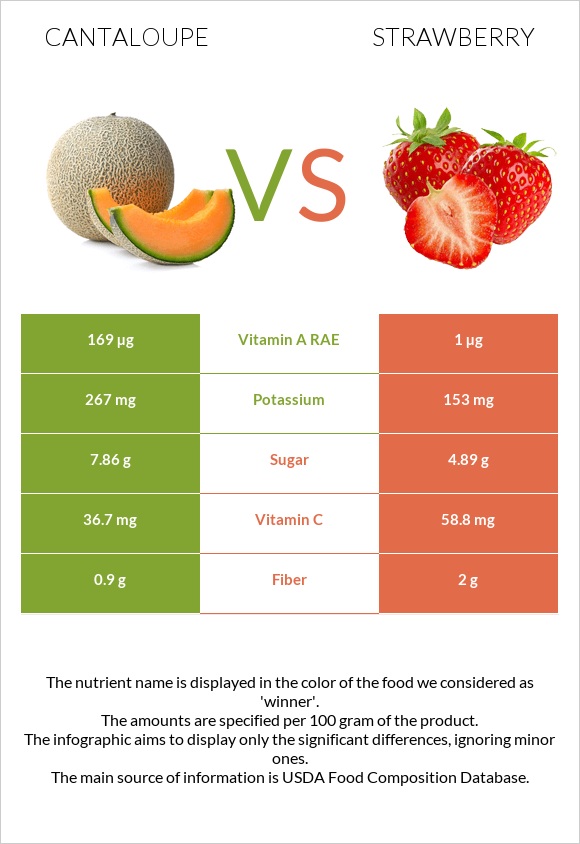Cantaloupe vs. Strawberry — In-Depth Nutrition Comparison
Compare
What are the differences between cantaloupe and strawberries?
- Cantaloupe is higher in vitamin A, yet strawberries are higher in vitamin C and manganese.
- Cantaloupe's daily need coverage for vitamin A is 67% more.
- Cantaloupe has 2 times more potassium than strawberries. While cantaloupe has 267mg of potassium, strawberries have only 153mg.
- The amount of sugar in strawberries is lower.
- The glycemic index of strawberries is lower.
We used Melons, cantaloupe, raw and Strawberries, raw types in this article.
Infographic

Infographic link
Mineral Comparison
Mineral comparison score is based on the number of minerals by which one or the other food is richer. The "coverage" charts below show how much of the daily needs can be covered by 300 grams of the food.
| Contains more PotassiumPotassium | +74.5% |
| Contains more ZincZinc | +28.6% |
| Contains more CalciumCalcium | +77.8% |
| Contains more IronIron | +95.2% |
| Contains more CopperCopper | +17.1% |
| Contains more PhosphorusPhosphorus | +60% |
| Contains less SodiumSodium | -93.8% |
| Contains more ManganeseManganese | +841.5% |
Vitamin Comparison
Vitamin comparison score is based on the number of vitamins by which one or the other food is richer. The "coverage" charts below show how much of the daily needs can be covered by 300 grams of the food.
| Contains more Vitamin AVitamin A | +16800% |
| Contains more Vitamin B1Vitamin B1 | +70.8% |
| Contains more Vitamin B3Vitamin B3 | +90.2% |
| Contains more Vitamin B6Vitamin B6 | +53.2% |
| Contains more Vitamin KVitamin K | +13.6% |
| Contains more Vitamin CVitamin C | +60.2% |
| Contains more Vitamin EVitamin E | +480% |
| Contains more Vitamin B2Vitamin B2 | +15.8% |
| Contains more Vitamin B5Vitamin B5 | +19% |
| Contains more FolateFolate | +14.3% |
All nutrients comparison - raw data values
| Nutrient |  |
 |
DV% diff. |
| Vitamin C | 36.7mg | 58.8mg | 25% |
| Vitamin A | 169µg | 1µg | 19% |
| Manganese | 0.041mg | 0.386mg | 15% |
| Fiber | 0.9g | 2g | 4% |
| Potassium | 267mg | 153mg | 3% |
| Iron | 0.21mg | 0.41mg | 3% |
| Vitamin E | 0.05mg | 0.29mg | 2% |
| Vitamin B3 | 0.734mg | 0.386mg | 2% |
| Vitamin B6 | 0.072mg | 0.047mg | 2% |
| Calcium | 9mg | 16mg | 1% |
| Copper | 0.041mg | 0.048mg | 1% |
| Phosphorus | 15mg | 24mg | 1% |
| Sodium | 16mg | 1mg | 1% |
| Vitamin B1 | 0.041mg | 0.024mg | 1% |
| Folate | 21µg | 24µg | 1% |
| Fructose | 1.87g | 2.44g | 1% |
| Calories | 34kcal | 32kcal | 0% |
| Protein | 0.84g | 0.67g | 0% |
| Fats | 0.19g | 0.3g | 0% |
| Net carbs | 7.26g | 5.68g | N/A |
| Carbs | 8.16g | 7.68g | 0% |
| Magnesium | 12mg | 13mg | 0% |
| Sugar | 7.86g | 4.89g | N/A |
| Zinc | 0.18mg | 0.14mg | 0% |
| Starch | 0.03g | 0.04g | 0% |
| Selenium | 0.4µg | 0.4µg | 0% |
| Vitamin B2 | 0.019mg | 0.022mg | 0% |
| Vitamin B5 | 0.105mg | 0.125mg | 0% |
| Vitamin K | 2.5µg | 2.2µg | 0% |
| Choline | 7.6mg | 5.7mg | 0% |
| Saturated fat | 0.051g | 0.015g | 0% |
| Monounsaturated fat | 0.003g | 0.043g | 0% |
| Polyunsaturated fat | 0.081g | 0.155g | 0% |
| Tryptophan | 0.002mg | 0.008mg | 0% |
| Threonine | 0.017mg | 0.02mg | 0% |
| Isoleucine | 0.021mg | 0.016mg | 0% |
| Leucine | 0.029mg | 0.034mg | 0% |
| Lysine | 0.03mg | 0.026mg | 0% |
| Methionine | 0.012mg | 0.002mg | 0% |
| Phenylalanine | 0.023mg | 0.019mg | 0% |
| Valine | 0.033mg | 0.019mg | 0% |
| Histidine | 0.015mg | 0.012mg | 0% |
Macronutrient Comparison
Macronutrient breakdown side-by-side comparison
Protein:
0.84 g
Fats:
0.19 g
Carbs:
8.16 g
Water:
90.15 g
Other:
0.66 g
Protein:
0.67 g
Fats:
0.3 g
Carbs:
7.68 g
Water:
90.95 g
Other:
0.4 g
| Contains more ProteinProtein | +25.4% |
| Contains more OtherOther | +65% |
| Contains more FatsFats | +57.9% |
~equal in
Carbs
~7.68g
~equal in
Water
~90.95g
Fat Type Comparison
Fat type breakdown side-by-side comparison
Saturated fat:
Sat. Fat
0.051 g
Monounsaturated fat:
Mono. Fat
0.003 g
Polyunsaturated fat:
Poly. Fat
0.081 g
Saturated fat:
Sat. Fat
0.015 g
Monounsaturated fat:
Mono. Fat
0.043 g
Polyunsaturated fat:
Poly. Fat
0.155 g
| Contains less Sat. FatSaturated fat | -70.6% |
| Contains more Mono. FatMonounsaturated fat | +1333.3% |
| Contains more Poly. FatPolyunsaturated fat | +91.4% |
Carbohydrate type comparison
Carbohydrate type breakdown side-by-side comparison
Starch:
0.03 g
Sucrose:
4.35 g
Glucose:
1.54 g
Fructose:
1.87 g
Lactose:
0 g
Maltose:
0.04 g
Galactose:
0.06 g
Starch:
0.04 g
Sucrose:
0.47 g
Glucose:
1.99 g
Fructose:
2.44 g
Lactose:
0 g
Maltose:
0 g
Galactose:
0 g
| Contains more SucroseSucrose | +825.5% |
| Contains more MaltoseMaltose | +∞% |
| Contains more GalactoseGalactose | +∞% |
| Contains more StarchStarch | +33.3% |
| Contains more GlucoseGlucose | +29.2% |
| Contains more FructoseFructose | +30.5% |
~equal in
Lactose
~0g





